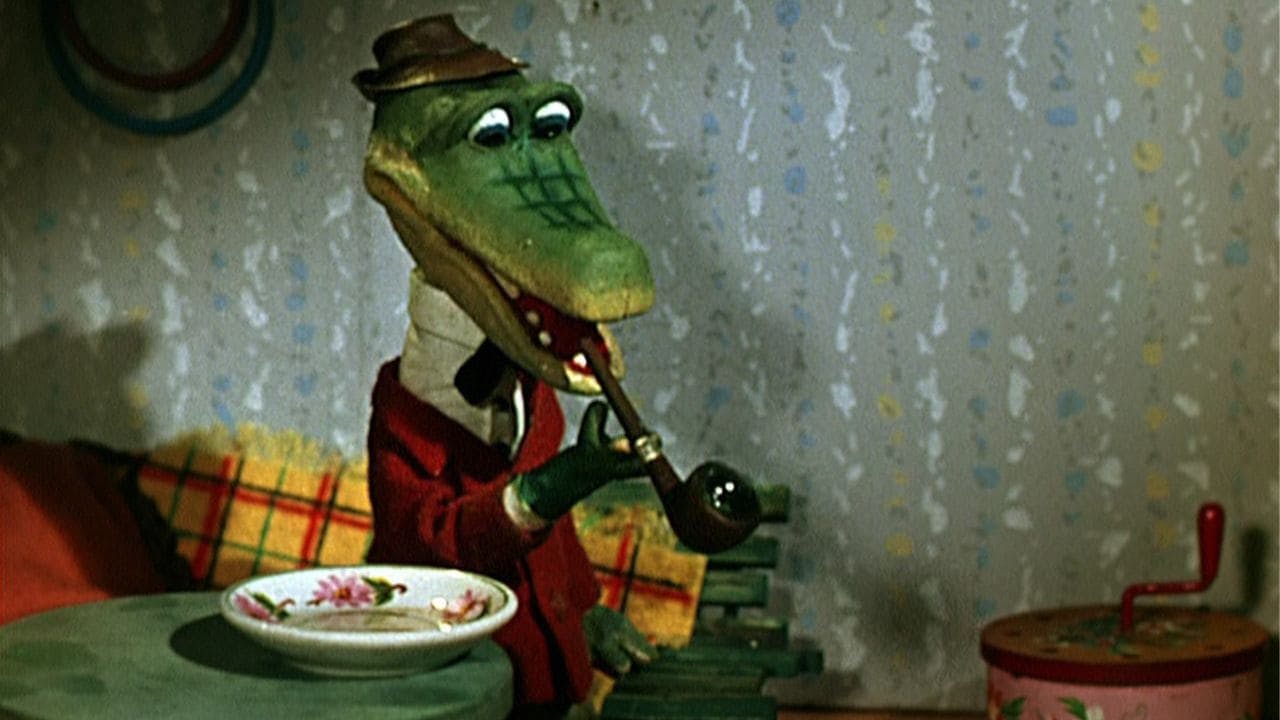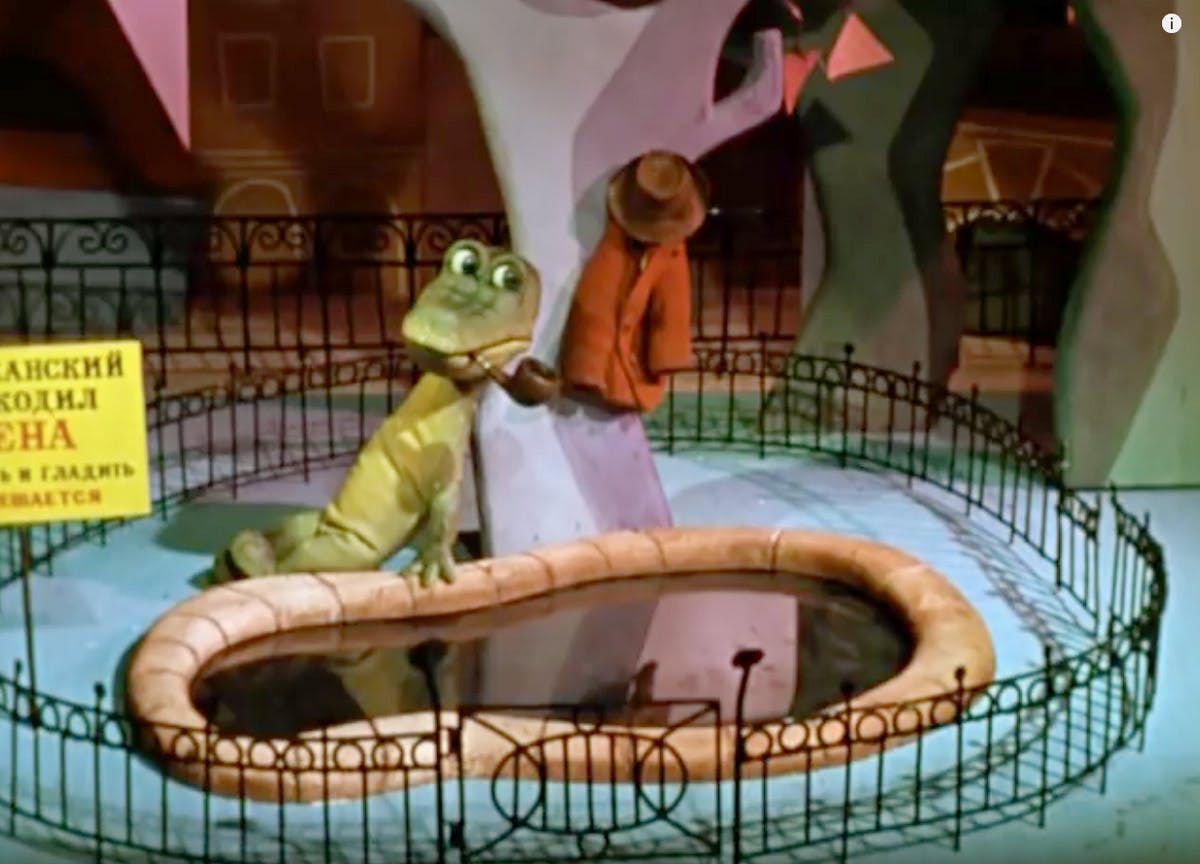SHARE
Coveting the Work-Life Balance of a Cartoon Crocodile

Susie Armitage looks at the Soviet-era cartoon Cheburashka and our modern attitude towards employment and identity
|
Culture
One morning in my college Russian 101 class, the professor put on a 1969 Soviet cartoon called Gena the Crocodile, which she promised would introduce some important facets of Communist society. It’s filmed in stop-motion animation, with an accordion-tinged opening tune that sounds dour by the standards of American children’s TV. The titular reptile, Gena — short for Gennady — lives in a big city. He’s employed at the zoo — “as a crocodile,” the narrator clarifies. Gena’s “office” is a small enclosure surrounded by a low fence, where he spends the day lounging by the pool, smoking his pipe, reading the paper and restlessly checking his watch. His handsome red smoking jacket and hat hang neatly on a nearby tree.
When the zoo closes, Gena slips behind the tree to change, emerging moments later in a crisp white shirt and snappy black bow tie. (Of course, we’ve already seen him au naturel, but his desire for modesty is an endearing touch.) He clocks out behind an umbrella-toting lion and a bear clad in a wool coat, and heads home to decompress before another day on the job.

Gena’s evenings are grim and lonely. At one point, he places his hat atop a teapot and slides his pipe into its spout, forming a makeshift, inanimate companion. Eventually he posts a notice outside on a phone booth: “Young crocodile seeks friends.”
Living in that very phone booth is Gena’s soon-to-be sidekick Cheburashka, a diminutive sort-of bear, sort-of mouse with a syrupy child’s voice, huge doll-like eyes and fuzzy, saucer-sized ears. Cheburashka has been discovered by a Soviet shopkeeper inside a crate of imported oranges. As the first order of business, he’s taken to the zoo to be identified and assigned a job, but is swiftly rejected as a species “unknown to science.” Another shopkeeper recruits him to stand in a store window, hoping he’ll draw in some foot traffic. But soon Gena helps rescue him and the two become friends, sharing adventures over the rest of the four-part series.
After college, I spent a few years living in Ukraine and Russia, where I was often asked, “What do you do?” In Russian, however, the phrasing is a bit different: “Who do you work as?” When I answered — English teacher, NGO worker, journalist — I sometimes thought of Gena, whose employment “as a crocodile” initially helped me remember how to construct a grammatically correct response.
Gena doesn’t appear to enjoy his zoo gig very much, but he also doesn’t seem to actively hate it. The message for young viewers is that we’ve all got to work, even crocodiles and bizarre bear-mouse beings. As scholars Juan Miguel Valdera Gil and Francisco Javier Valdera Gil note in their paper, Ideological socialisation in childhood: Cheburashka, “all the main characters have an occupation,” and the show depicts labor as a source of “social cohesion and prestige.”
Gena’s work is key to his identity, but is never painted as a path to self-fulfillment.
But more subtly, the show also implies that we aren’t obligated to like our jobs, or to give the employer our complete allegiance. (As one Soviet joke put it, “they pretend to pay us, and we pretend to work.”) Gena and Cheburashka are celebrated for doing volunteer construction work, but we also see the shopkeeper who discovers the little beast in his fruit box pocket a state-owned orange for himself.
Gena’s work is key to his identity, but is never painted as a path to self-fulfillment. In contrast, as an upper-middle class, college-bound American millennial, I was raised to find meaning in my career. “Do what you love and you’ll never work a day in your life,” my peers and I were told. I grew up reading Dilbert in the newspaper. The comic made office life look miserable; my job, I figured, would never be like that.
Indeed, we aren’t really allowed to hate our jobs anymore, at least not publicly. As a recent New York Times piece notes, “In the new work culture, enduring or even merely liking one’s job is not enough. Workers should love what they do, and then promote that love on social media, thus fusing their identities to that of their employers.” Having previously worked for a digital media start-up, this rings uncomfortably true. My colleagues and I were showered with corporate swag — sweatshirts, tees, blankets, keychains, beer cozies, backpacks and slippers — some of which I dutifully photographed and posted on Instagram. This “toil glamour,” as the article’s author, Erin Griffith, points out, comes at a time of increasing economic precarity, even for those with college degrees. The same company that had an office fro-yo machine and treated us to lunch twice a week also let me and hundreds of my former colleagues go.
While teaching English in Ukraine and consulting at a youth center in a small Russian city, I began to understand the particular cultural attitudes I brought to work. I was impatient with my coworkers’ habit of taking 30-minute tea breaks, and they didn’t understand why I was always trying to get so much done. It’s not that my colleagues despised their jobs, or didn’t take pride in their work. But they were confused why I would come to the office when I wasn’t feeling well, or spend hours on independent projects no one had asked me to undertake.
Now that I’m older — and feeling increasingly burned out as a freelancer with three part-time jobs — I’ve grown skeptical of why we’re encouraged to invest so much in our careers. My demographic has been socialized to embrace “workism,” which Derek Thompson, writing in the The Atlantic, defines as “the belief that work is not only necessary to economic production, but also the centerpiece of one’s identity and life’s purpose; and the belief that any policy to promote human welfare must always encourage more work.”
When I write for money, I feel privileged to be paid to do something I love. But I am almost always thinking about work: where to get it, when I’ll manage to finish it, if it will pay enough for me to make rent — and of course, if people will like the things I produce. I wish it were more economically feasible for me to turn off that part of my brain, and for everyone to have a job that provides a decent standard of living and work-life balance. Sometimes I picture Gena nodding goodnight to the security guard as he clocks out of the zoo. I imagine how nice it would be if we all had a little tree like his, where we could hang our coats and hats, put in a day’s work and then go home.
Try a cup on us
Order A Sample

SHARE
